Is some new “people’s monarchy” in the commonwealth realms at hand?
Nov 22nd, 2010 | By Randall White | Category: Canadian Republic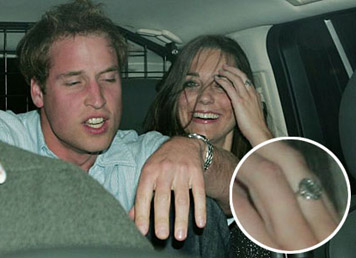 At the level of international political soap opera, at any rate, are we or are we not on the verge of some kind of revival of the ancient British monarchy, in an age of resurgent conservatism in the new global village on which the sun still never dares to set?
At the level of international political soap opera, at any rate, are we or are we not on the verge of some kind of revival of the ancient British monarchy, in an age of resurgent conservatism in the new global village on which the sun still never dares to set?
For our particular purposes here, the question of course applies to the United Kingdom itself, but also to the 15 other so-called “commonwealth realms,” that still recognize the British monarch as head of state (mmmm, well, yes, hello Professor Franks in Canada : or at least as a constitutional monarch of some kind of ultimate symbolic importance)?
The question has been raised (of course again) by last week’s announcement that Prince William and Kate Middleton are engaged at last – and “reportedly want their wedding to be a ‘people’s ceremony’ with as many members of the public invited as possible.”

Greg Barns: “Lawyer, music-lover, runner and trouble-maker” – and passionate Australian republican.
Meanwhile something called the Mirror in the UK has reported that: “The Queen is expected to send William and Kate on a tour of the Commonwealth after their wedding … She wants them to be ‘peacemakers’ to calm republican unrest in Australia and Canada – both likely to be early stopovers … A source said: ‘There’s a lot of goodwill for them and together their presence can stop any talk of getting rid of the monarchy.’”
Mmmm (again) … Has anyone told Greg Barns in the Land of Oz about this? He ran the Australian Republican Movement campaign during the 1999 republic referendum down under (which almost won, despite fierce opposition from then monarchist PM John Howard etc – and a not quite perfected “republican model”). Much more recently, on November 9, 2010, he gave a talk at the Deakin University colloquium on “Yes we’re still a monarchy but it is not my fault.” He focused on how such “deliberative democracy” institutions as the BC Citizens’ Assembly on electoral reform in Canada might be adapted to furthering the republican cause in Australia (or Canada for that matter: CLICK HERE for further details).
And then here in Canada itself, we have had the likes of Manitoba MP Pat Martin and longtime Canadian republican advocate Tom Freda dumping large barrels of cold water on the ultimate prospects of “William and Kate” in the true north strong and free. John Mazerolle has written about how “If I were king for a day, I’d abolish the monarchy,” in the Vancouver edition of Metro news. In the high-tech region of Southern Ontario Gerry Barker in the Guelph Mercury has asked: “Does Canada even need a queen? Or a king?” And he has concluded: “It’s time to recant our allegiance to the British monarchy and assert ourselves as an independent nation.”
Prince Charles as environmental crusader … nostalgia for feudalism among old landed gentry
Back in the British monarchy’s United Kingdom homeland, in the 4 November 2010 issue of the London Review of Books, the excellent Jenny Diski has also offered a short and far-from-laudatory review of Harmony: A New Way of Looking at Our World by HRH the Prince of Wales, Tony Juniper and Ian Skelly (Blue Door, 329 pp., £25, October, 978 0 00 734803 9).
This book presents Prince Charles (Prince William’s father) in his environmental crusader smoking jacket – an act that the former head of the Monarchist League of Canada John Aimers used to like to point to, as evidence of how forward-looking the monarchy is nowadays. On Ms. Diski’s view, however: “I do wonder if HRH the Prince of Wales is really the best (though he’s obviously the wealthiest) advocate for the new sanity that might save the planet.”
Two points in Jenny Diski’s review of Prince Charles’s Harmony book seem especially striking. Some of what he and his two fellow authors say, she suggests, “in some ways is perfectly true, but although the prince does mention global corporations as being part of the problem, he doesn’t get round to the underlying issue: that capitalism is the prime mover of what troubles him, and that capitalism seems well and truly suited to the dominant creatures that inhabit the planet.”
Similarly: “Although HRH is perfectly clear about the causes of the oncoming catastrophe, he is not very helpful as to how exactly to alter the trajectory. At least not in the world as it is.” He puts a lot of stress on an “ancient wisdom” that apparently assigned a much higher value to “Nature Herself” than we do today. Yet Ms. Diski urges: “Since the late 19th century a particular kind of nature spirituality has been dear to the hearts of the … English and Anglo-Irish upper classes and landed gentry.” And, in the end: “For all the talk of the good, spirit and Nature Herself, I suspect that what HRH is really missing is feudalism.”
Why Prince William cannot finally just skip over his father
Prince Charles, of course (to say nothing of his second wife, Camilla), is not very popular anywhere, in any of his known incarnations to date. And one thing the announcement of his son Prince William’s engagement clearly has revived is talk of skipping a generation in the hereditary succession to Queen Elizabeth II. (She, it should be noted as well, of course, is now 84, but her mother lived to the ripe old age of 101!)
So, just yesterday, eg, the Calgary Herald published an AFP report headlined “Britons want William for next king, not Charles: polls.” As explained here: “Britons want Prince William and his new fiancee Kate Middleton to be their next king and queen, instead of the current heir to the throne Prince Charles and his wife Camilla, three polls showed Sunday … The revealing surveys come on the back of a wave of public support for the eldest son of Charles and his late ex-wife Princess Diana, after William announced that he and Kate would marry next year.”
A few further things can already be said about all this. To start with, republican advocates like Tom Freda in Canada are almost certainly right when they urge that the argument for having Prince Charles somehow bow out of the succession, in favour of his more popular son, Prince William, is itself a sign of “how precarious the monarchy is in comparison to even 20 or 30 years ago” – and not any seriously credible mark of renewed strength and vigour.
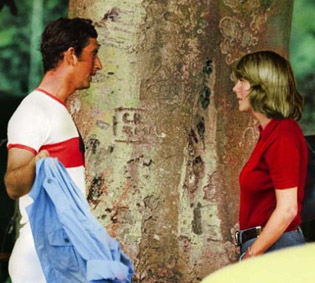
A 27-year-old Prince Charles chats with Camilla Parker Bowles at a polo match, 1975. Photograph: Rex Features.
Moreover, however popular this kind of prospect may be, MSNBC in the USA has recently published an AP report, which nicely explains how, even if the public prefers William, the rules of succession decree that Charles goes first : “Constitutional experts like professor and author Vernon Bogdanor point out that even if Charles were extremely unpopular there is no easy way to alter the line of succession, which is not designed to bend to public opinion or respond to the whims of tabloid newspaper editors … There is no precedent in modern British history of a would-be king stepping down or being passed over so his son could accede to the throne … ‘People often talk about that possibility, but we live in a parliamentary monarchy and any arrangement to change the succession has to go through parliament, not just in Britain, but in other parliaments, including Australia, New Zealand, Jamaica and others,’ he said [Professor Bogdanor might have added Canada here: in fact the geographically largest and most populous of the 15 commonwealth realms beyond the United Kingdom : it is probably a little interesting that for some reason he did not?] … ‘You can’t just decide to skip a generation, it’s not going to happen.’ … He said altering the succession would undermine the principle of constitutional monarchy, which is based on the concept that determining who ascends to the throne is not a matter of individual choice … ‘It would raise the argument of who is best suited to be head of state, which having a constitutional monarchy avoids,’ he said …”
Queen Camilla last straw …Â inevitability of republican option in Australia, Canada, etc, etc
So … Unless such renowned constitutional experts as Professor Bogdanor are quite mistaken, supporters of the British monarchy in any geographic location where it still holds some symbolic sway (in theory at least) are in fact stuck with the environmental crusader Prince Charles. (Unless he should unhappily pass away before his mother! And unless, in places like Canada of course, we pass a constitutional amendment which follows Gerry Barker’s advice to “recant our allegiance to the British monarchy and assert ourselves as an independent nation.”)
What’s more, if there is one person even less popular than Prince Charles, it is his second wife, the former Camilla Parker-Bowles. And the past few days have seen some additional intelligence on this front as well. As reported on a site known as “Official Wire,” just yesterday again: “The heir to the throne of the British Commonwealth, Prince Charles, says it’s possible his second wife Camilla could assume the title of queen … In an interview with NBC’s Brian Williams, Charles appeared off-guard when asked about the potential status change to co-monarch for Camilla, The Daily Telegraph reported … ‘That’s, well … we’ll see, won’t we? That could be,’ the heir-apparent said … The 62-year-old is the heir to his mother, Queen Elizabeth, who has made no indication of stepping down at the age of 84 … Camilla Parker-Bowles and Charles were reportedly romantically linked before and during his marriage to Diana Spencer in 1981. Diana was killed in a Paris car crash in 1997 and Charles married Camilla eight years later … Diana assumed the title and role of Princess of Wales, but the royal family opted not to re-bestow that title on Camilla, instead referring to her as the Duchess of Cornwall, or ‘Princess Consort,’ the newspaper said.”
Elsewhere in the United Kingdom itself, it has been reported: “Polls have … suggested that the idea of Queen Camilla is less popular now than when she married into the Royal Family five years ago.” And there appears to be nothing to suggest the current Duchess of Cornwall is any more of an asset to the 2010 British monarchy in such places as Australia and Canada. Yet as recently as today it has also been reported (on a website based in the Indian state of Kerala) that: “UK Prime Minister David Cameron has voiced his support for the Duchess of Cornwall to become Queen and admitted being a ‘big fan’ of Camilla … He said that the public is warming to Prince Charles’s second wife, despite signs that voters would prefer the monarchy to miss a generation and pass directly from the Queen to Prince William … ‘I think the country is getting to know her and getting to see that she is a very warm-hearted person with a big sense of humour and a big heart,’ the Daily Mail quoted Cameron, as telling Sky News.”
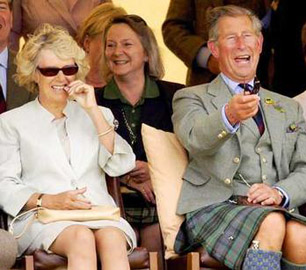
Camilla Parker Bowles and HRH the Prince of Wales at the Highland Games in Scotland 2003. Photo: Reuters.
In the very end, all this just seems to support something the eloquent Greg Barns from down under told an audience in Toronto, some seven years ago now: “The great thing about the cause of republicanism in Australia, New Zealand and Canada is that we collectively have history on our side. The end of the British monarchy in our countries is inevitable and it is only a question of time before each of our nations finally grounds sovereignty firmly in our people.” In the second decade of the 21st century, even a royal couple like William and Kate will not be able to “calm republican unrest in Australia and Canada” – let alone “stop any talk of getting rid of the monarchy.” Out of old-fashioned parliamentary democratic respect, nothing may finally happen practically until the unhappy death of Queen Elizabeth II. But recent Canadian opinion polls suggest that Greg Barns is still quite right.
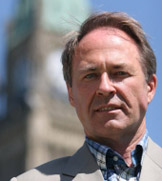

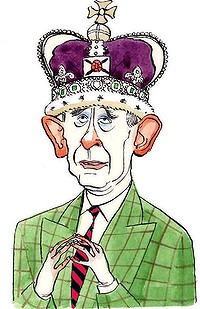
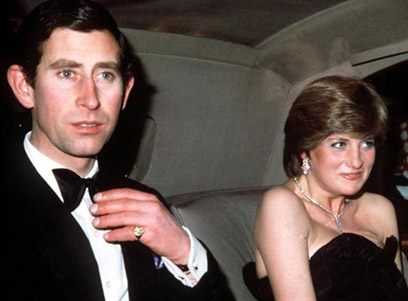


[…] This post was mentioned on Twitter by Counterweights , Deakin Blog. Deakin Blog said: Is some new British “people's monarchy†in the commonwealth realms …: Much more recently, on November 9, 2010,… http://bit.ly/gHDkJf […]
http://topsy.com/www.counterweights.ca/2010/11/is-some-new-british-%E2%80%9Cpeople%E2%80%99s-monarchy%E2%80%9D-in-the-commonwealth-realms-at-hand/?utm_source=pingback&utm_campaign=L2